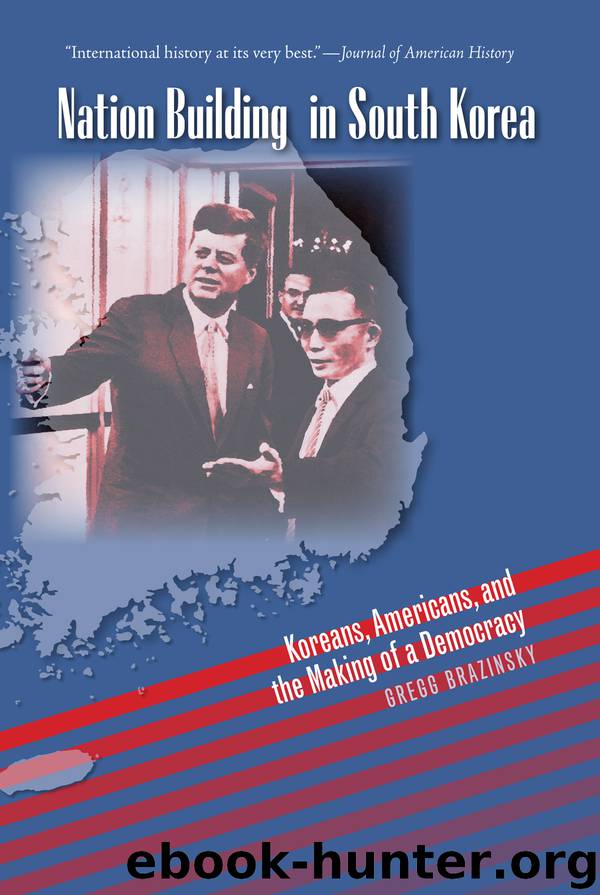Nation Building in South Korea Koreans, Americans, and the Making of a Democracy by Gregg Brazinsky

Author:Gregg Brazinsky
Language: eng
Format: epub
Publisher: The University of North Carolina Press
Published: 2010-03-15T16:00:00+00:00
6. Engaging South Korean Intellectuals
Although the United States formally supported what could at best be called a quasi-democratic system of government between 1961 and 1972 and even helped derail its opposition on key issues, Americans working on the ground in the Republic of Korea (ROK) still hoped to broaden the scope of participation in national politics and pave the way for more genuine democracy. South Korea’s influential community of intellectuals became vital in this regard. U.S. officials thought that the involvement of scholars and journalists in the process of nation building would add legitimacy to the state’s development programs and encourage the country’s political evolution. By fostering enthusiasm for economic progress among Korean intellectuals, the Americans hoped to quiet a potential source of dissent while giving the government a reason to trust this key sector of the population and incorporate its insights into the decision-making process.
But Americans also believed that for academics to become meaningfully involved in promoting national development, they would need new ways of thinking about the process. Official and private organizations made a concerted effort to stimulate discussions on development among leading South Korean intellectuals. They tried in particular to promote modernization theory, which offered a social scientific explanation of how emerging nationstates could develop their economies and political systems—a major preoccupation of U.S. social scientists during the Cold War. Americans hoped that studying modernization would instill in Korean scholars a new participatory ethos and enable them to play a more significant role in public affairs. Moreover, because modernization theory and its intellectual sibling, area studies, contained an intrinsic critique of Communism, Americans believed that it could foster a sense of nationalism that would not identify with North Korea.
Many South Koreans came to share America’s enthusiasm for modernization theory, although they rejected its assumptions of Western superiority. The theory’s optimistic faith that any state could follow a path to national prosperity captured the imagination of these scholars, who themselves craved higher standards of living. Even while becoming deeply committed to studying and precipitating national modernization, however, intellectuals adapted the concept to their own aspirations and goals. They eventually derived a hybrid conception of modernization that emphasized the possibility of achieving rapid socioeconomic change while preserving Korean traditions and culture.
Although the idea of a distinctly Korean version of modernization did promote a dialogue between intellectuals and the state, the dialogue was short-lived. The state’s move toward greater authoritarianism in the late 1960s made exchanging ideas an increasingly one-sided process and divided the academic community. Some intellectuals continued to embrace the Park regime because its developmental agenda embodied their vision of a modernization process that differed from the one employed in the West. These scholars even provided some of the philosophical basis for the creation of the Yusin system. Other South Koreans, however, argued that even a distinctly Korean version of modernization needed to be accompanied by democratization and, as Park turned toward authoritarianism, became an important source of opposition to the regime.
Download
This site does not store any files on its server. We only index and link to content provided by other sites. Please contact the content providers to delete copyright contents if any and email us, we'll remove relevant links or contents immediately.
| Arms Control | Diplomacy |
| Security | Trades & Tariffs |
| Treaties | African |
| Asian | Australian & Oceanian |
| Canadian | Caribbean & Latin American |
| European | Middle Eastern |
| Russian & Former Soviet Union |
The Secret History by Donna Tartt(19007)
The Social Justice Warrior Handbook by Lisa De Pasquale(12178)
Thirteen Reasons Why by Jay Asher(8875)
This Is How You Lose Her by Junot Diaz(6862)
Weapons of Math Destruction by Cathy O'Neil(6252)
Zero to One by Peter Thiel(5772)
Beartown by Fredrik Backman(5719)
The Myth of the Strong Leader by Archie Brown(5484)
The Fire Next Time by James Baldwin(5416)
How Democracies Die by Steven Levitsky & Daniel Ziblatt(5201)
Promise Me, Dad by Joe Biden(5132)
Stone's Rules by Roger Stone(5068)
A Higher Loyalty: Truth, Lies, and Leadership by James Comey(4942)
100 Deadly Skills by Clint Emerson(4901)
Rise and Kill First by Ronen Bergman(4765)
Secrecy World by Jake Bernstein(4732)
The David Icke Guide to the Global Conspiracy (and how to end it) by David Icke(4687)
The Farm by Tom Rob Smith(4490)
The Doomsday Machine by Daniel Ellsberg(4476)
